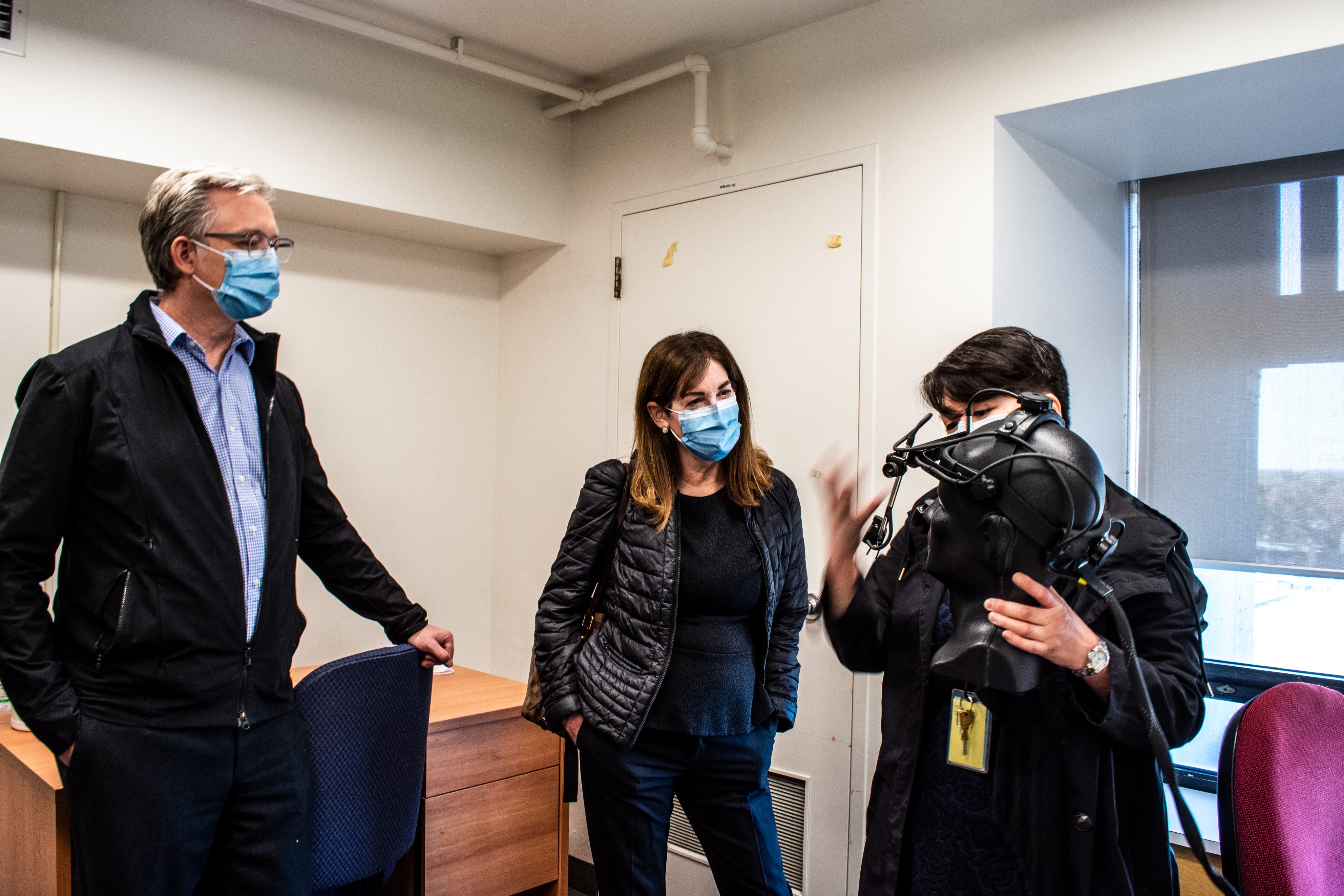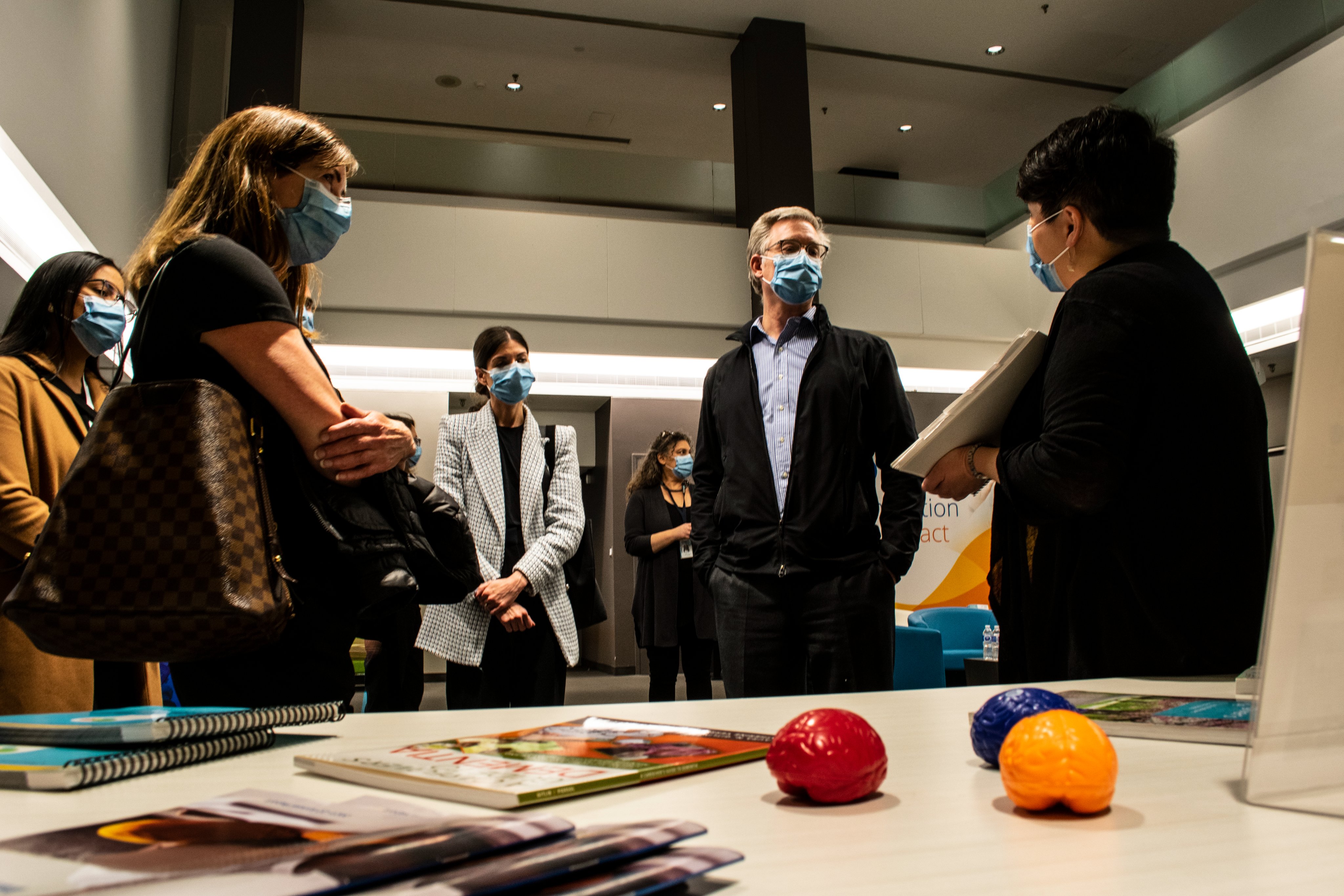On October 27, 2022, a delegation from the OHA visited Baycrest to discuss critical research taking place on the campus, and why it is important to continue to support hospitals in pursuing pioneering work to re-think the journey of aging.
Leading research to transform aging
Baycrest is a global leader in research, innovation, education, and care for older adults, and ranked the #1 most research-intensive hospital in Canada.[1] Led by Baycrest's Rotman Research Institute (RRI), dementia research across Baycrest covers a spectrum of crucial issues, with an emphasis on the prevention, early detection, and treatment and care of Alzheimer's disease and other forms of dementia. Baycrest is also home to a robust research and innovation network, including the scientific headquarters of the Canadian Consortium on Neurodegeneration in Aging (CCNA), Canada's largest national dementia research initiative.
In addition to world-renowned scientists, the RRI houses state-of-the-art brain imaging and other neuroscience technologies, such as magnetoencephalography (MEG), magnetic resonance imaging (MRI), transcranial magnetic stimulation (TMS), and eye tracking, highlighting Baycrest's unique research capabilities. OHA delegates had a chance to image their own brainwaves using the InteraXon Muse system, which RRI scientists use to train the next generation of neuroscientists, as well as in innovative research on the impacts of mindfulness training on older adults, the effects of COVID-19 on the brain, and digital biomarkers for dementia.
As part of their tour, OHA representatives visited several of these facilities, as well as the Anne & Allan Bank Centre for Clinical Research Trials (CCRT). The CCRT is a unique, multi-disciplinary department focused on conducting clinical trials and observational studies to help advance knowledge in – and find effective treatments for – Alzheimer's and other types of dementia.
Combining research and care
The OHA and its members are seeking to create a fully integrated health research and care delivery system across Ontario that drives sustainable and transformational science, clinical excellence, health equity, and an agile, diverse workforce of scientists and innovators. Baycrest's combination of research and care is a leading example of this model, aligning with this aim.
 The team also toured the newly opened Kimel Family Centre for Brain Health and Wellness, a first-of-its-kind community centre focused on dementia prevention. The state-of-the-art facility brings in community members for wellness programs and integrated research to prevent cognitive decline, with the aim of creating personalized brain health prescriptions to help every older adult live better for longer.
The team also toured the newly opened Kimel Family Centre for Brain Health and Wellness, a first-of-its-kind community centre focused on dementia prevention. The state-of-the-art facility brings in community members for wellness programs and integrated research to prevent cognitive decline, with the aim of creating personalized brain health prescriptions to help every older adult live better for longer.
Another unique unit at Baycrest is the Sam and Ida Ross Memory Clinic, where research is embedded in clinical care, and rich data is meticulously collected and maintained in a large research database. This allows researchers and clinicians to identify factors that may influence the development of cognitive decline and dementia. As well, in collaboration with the RRI and the Toronto Dementia Research Alliance (TDRA), the Memory Clinic is developing an Artificial Intelligence platform for Baycrest's Pamela & Paul Austin Centre for Neurology and Behavioural Support, with the aim of optimizing patient care.
Empowering aging through innovation
The OHA team visited the Centre for Aging + Brain Health Innovation (CABHI), powered by Baycrest. A solution accelerator for the aging and brain health sector, CABHI provides funding and support to innovators for the development, testing, dissemination, and adoption of new ideas and technologies that address unmet brain health and older adults' care needs. Established in 2015 with foundational investments by the Governments of Canada and Ontario, it is a unique collaboration of healthcare, science, industry, not-for-profit, and government partners whose aim is to help improve quality of life for the world's aging population.
While visiting CABHI, the group had the opportunity to hear about the Learning Inter-Professionally Healthcase Accelerator (LIPHA), an innovative and effective virtual simulation-based learning platform to enhance the onboarding and training of a skilled workforce in the seniors' care sector. CABHI developed LIPHA in collaboration with the Ontario Centres for Learning, Research and Innovation in Long-Term Care at Baycrest and the RRI's Kunin-Lunenfeld Centre for Applied Research and Evaluation.
As well, the group learned about the CABHI-developed Leap, a welcoming, diverse, and engaged online community where life experience meets innovation. Leap bridges the gap between its members – older adults and caregivers, and the innovators developing solutions meant for them. Leap members connect to exchange stories, learn about aging and brain health innovations, and provide feedback to innovators to make their agetech solutions better and more readily accessed and adopted.
Towards a future where we can all age fearlessly
Baycrest and other academic hospitals are not solely users of agetech solutions and health care innovation; they are a major driving force in their own right.
“Research hospitals are the largest contributors to health research in the province and are home to world-class scientists with international and commercial connections," says Anthony Dale, President and CEO of the OHA. “As the province emerges from the COVID-19 pandemic and plans for the future, the importance of cultivating local innovation and investing in Ontario's health research sector has never been greater."
international and commercial connections," says Anthony Dale, President and CEO of the OHA. “As the province emerges from the COVID-19 pandemic and plans for the future, the importance of cultivating local innovation and investing in Ontario's health research sector has never been greater."
“With the Alzheimer Society of Canada predicting that nearly 1 million Canadians will be living with dementia by the year 2030, it has never been more crucial to fund research and innovation to support seniors' health and well-being," says Dr. Allison Sekuler, President and Chief Scientist of the Baycrest Academy for Research and Education and CABHI. “Research and innovation advances the prevention, detection, treatment, and care of dementia, so we can create a world in which everyone can age fearlessly."
[1] According to the latest Canada's Top 40 Research Hospitals ranking by Research Infosource.